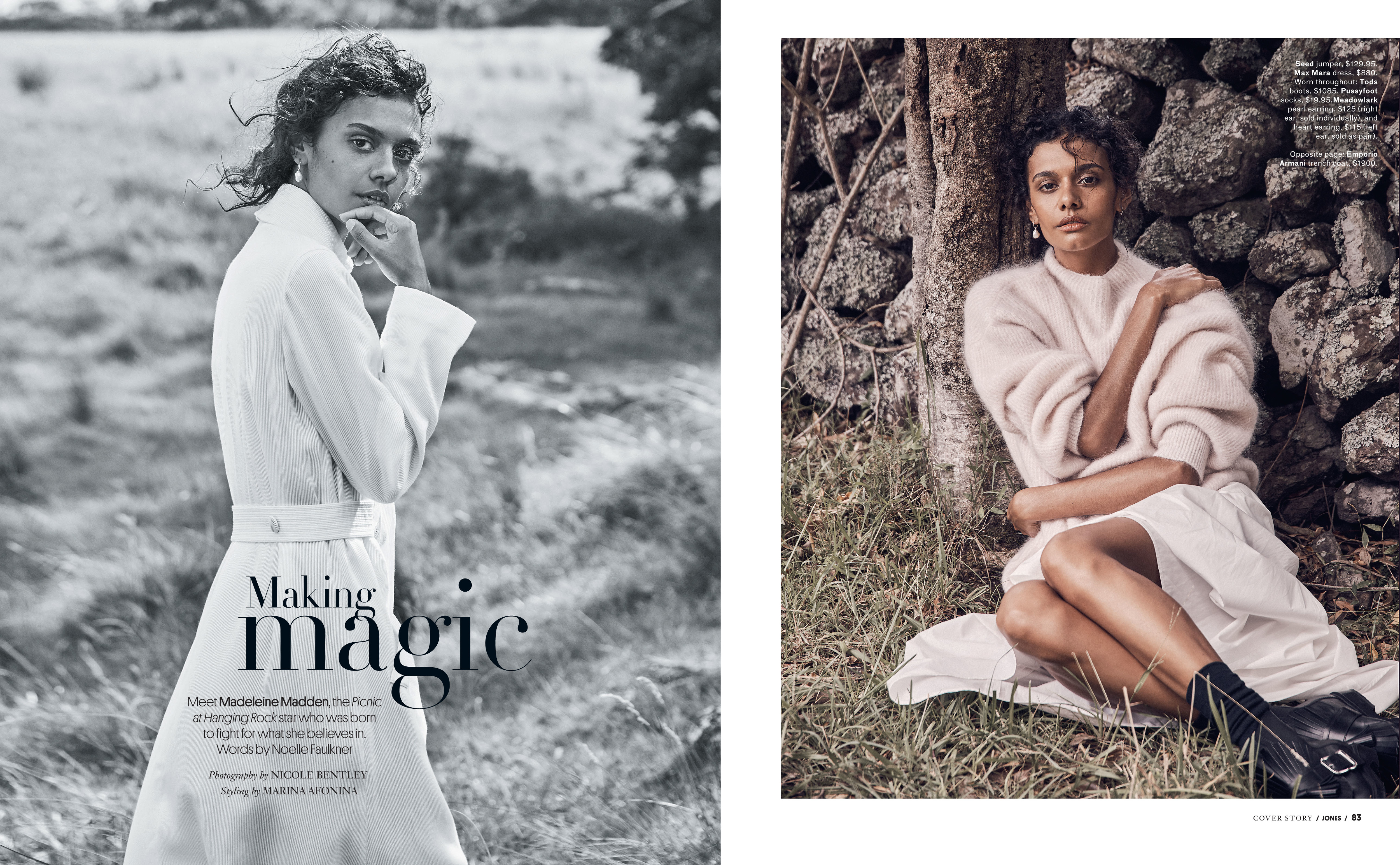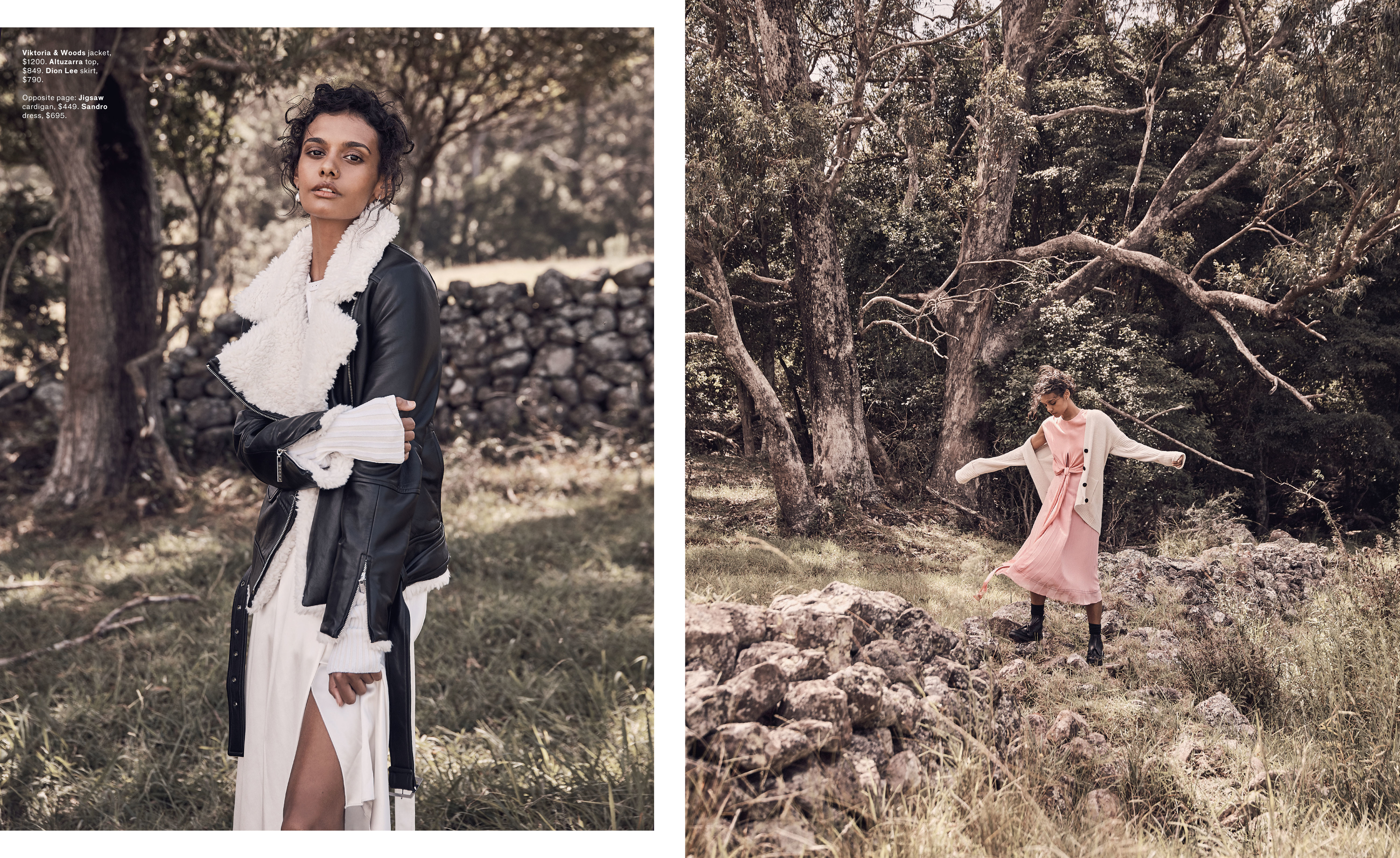Jones Magazine, Winter, 2018 (PDF)





Meet Madeleine Madden, the Picnic at Hanging Rock star who was born to fight for what she believes in.
You only need to spend minutes with Madeleine Madden, the Sydney-born actor and star of the upcoming Picnic at Hanging Rock series, to feel the lion’s heart that beats inside her, a perfect storm of legacy, heritage, youth and passion. As the great-granddaughter of Hetty Perkins, an elder and matriarch of the Eastern Arrernte people of Central Australia, granddaughter of Aboriginal rights activist Charles Perkins, daughter of art curator and writer Hetti Perkins, and niece to filmmaker and founder of Blackfella Films, Rachel Perkins, fearlessness runs in her DNA. “I’m one of six, there are a lot of us,” Madeleine says with a laugh, curled up in her grandfather Charles’ robe, talking to me from her home in Sydney’s inner west. “My family is a melting pot of performers, dancers, artists and musicians; they’re very passionate and they’ve always instilled a very progressive and creative attitude in us all.”
From a young age, Madeleine sought ways to flex her imagination – performances, storytelling, playing dress-ups. They were all precursors to her path as an actor (which kicked off at just eight years old) and creative outlets encouraged by her family. “I feel like every child puts on little shows, but that imaginative little kid has always been with me, so I guess acting was a way to keep that child-like imagination or spirit. Becoming a character and falling, diving headfirst into a role or a story – that’s what I loved about it.” Madeleine also credits her family for giving her strength to deal with the often-incessant rejection that comes with a life of auditions – particularly, to be completely frank, when working in an industry that for decades has whitewashed what it means to be an “Australian” character, and only recently has begun to change. “[The rejection] is something you learn along the way,” she says. “But my family are all in the arts, so they understand the competitive nature of it, the big wins and big losses. But it is really important in this industry to have good people in your life.”
For the 21-year-old, her grandfather’s legacy doesn’t just stop
with the bathrobe and warm thoughts – Madeleine also possesses his spirit and passion for social justice. At age 13, she was the first teenager to deliver an address to the nation on behalf of GenerationOne, an initiative to end indigenous disadvantage. She has also been a fervent campaigner to change the Australia Day date and is passionate about bringing indigenous stories to the screen. “If I can have a platform and use that platform as a way to create positive change, then I will,” she says. “For me, it’s about representing my community as best as I can, being an Aboriginal person in the media, and that’s what lights the fire in me: to represent the community.”
The fact that little girls with dreams of becoming stars now look to Madeleine is also not lost on her. “Every job or everything that I do, I try to do it to do better for the community,” she says. “My main motive behind all of this, [it] also being a job that I love doing, it is a kind of a legacy that you want to live up to and do justice to.”
Despite having starred in a Deborah Mailman-directed short (Ralph), a feature film with Christina Ricci and Jack Thompson (Around the Block), and the TV incarnation of Tomorrow, When the War Began, it’s the game-changing Sydney-based drama Redfern Now, which she had a small role in, that she considers to be one of her proudest early-career moments and her first real exposure to big TV shows. “My family has grown up in and around Redfern, and so many great things have come out of it, like the Black Theatre and Sydney’s Aboriginal Medical Service,” she says. “Redfern has always been a kind of meeting place for Aboriginal people, there’s a community there – which is why Redfern Now was such a fantastic show. It was a great drama for indigenous people, but also non-indigenous people because we weren’t being portrayed in a stereotypical way. I think it was one of the first shows that really viewed us in a realistic way. Yes, we have cultural differences, which is what makes us different and fantastic, but we’re not all that different. So for indigenous people, it was a really proud moment, and for non-indigenous people, it was a really insightful time...Getting to work with those brilliant directors, actors and writers really set me up for a great career.”
Now, it seems that Madeleine’s time has come. Next month the highly anticipated TV remake of Picnic at Hanging Rock will hit our screens, and in many ways, it’s become a huge success before it has even aired – the production company FremantleMedia International cut the largest US commercial deal ever for an Australian TV series when the series was sold to Amazon last year (along with the BBC and France’s Canal +) and scored a premiere screening at the 68th Berlin Film Festival, only the second Australian drama to do so. To be part of this new telling of a tale that has enthralled Australians for decades is no doubt a dream for any young actress, even if you don’t get to wail the infamous “MIRRRANNNDAAA!”
“When I met the directors Larysa Kondracki, Michael Rymer and Amanda Brotchie, they were so incredible and I just knew it was going to be something different,” she says. “Especially Larysa, who started off the series, really. She just painted this picture of a moody, broody, kind of edgy reimagining which just
instantaneously drew me towards it. I was so curious about how we were going to make it different from the original.”
Where the original 1975 film, directed by Peter Weir, crafted magical, soft-lens Lolita-esque imagery of broderie anglaise moving ethereally through the brutal Australian bush, Madeleine insists the TV series aims to be filed alongside The Handmaid’s Tale and Big Little Lies, telling the story through a feminist gaze via complex female characters. “We’re saying much more about the girls’ history, where they come from, and where they want to go, really,” she explains.
Starring alongside Game of Thrones’ Natalie Dormer, Lily Sullivan, Yael Stone (Orange is the New Black) and Samara Weaving, Madeleine plays Marion, an intelligent and studious girl with a mixed-race heritage, born out of wedlock – a complicated character for the time. “What I loved about playing Marion, and this is something that I look for in all the roles I take on, was that she’s a really strong female character,” she says. “And Marion’s challenges are very unique, they don’t really apply to the other girls, in terms of her race and things like that. For me, she’s a character that is just way before her time, but also a trailblazer for future generations of women – she’s not going to have the kind of future that all of our other girls will, in terms of being married off or whatever. So she really needs to be an individual and work hard, which is something that I really loved. I think that all of the girls want to have some form of independence, and in a bittersweet way, Marion has that.” She adds, “She was a really juicy character that I was just wanted to sink my teeth into.”
This intrepid spirit flickers in the way Madeleine talks about pretty much everything. Is this something she is conscious of? She laughs. "Failure is not trying," she says. "When you give it your all, and you really just go for something, then you can’t say that you didn’t try. It’s hard sometimes to apply that to everything in life, but that’s what I just try and live by. If it doesn’t work out, then that door closes and another one will open.”
This is the answer that many other women give when asked about what it means to be fearless. That failure deemed irrelevant equals fearless living, and that the fight is worth having. “My grandfather was a real fighter, and he really worked so hard to get where he was, and all of the work that he has done has really helped me and a lot of other Aboriginal people. And I sort of apply that to my work and in life.” Madeleine’s brain ticks. “It’s something that, in a weird way, society has ingrained in the female psyche as well – it’s like ‘Don’t provoke anyone. Stay on the sidelines.’ No, I’m actually not going to do that. We’ve always kind of had the power when we come together, but that’s the thing. There’s nothing wrong with failure. It just makes you a stronger person. That’s what living fearlessly means to me.”
Picnic at Hanging Rock will premiere on Foxtel’s Showcase channel on Sunday, May 6.